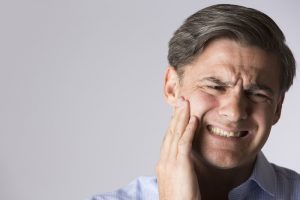What to Do For a Clicking, Popping Jaw (AKA TMJ)
December 10, 2017
 Jaw pain is the most noticeable side effect of what a lot of people refer to as “TMJ.” It’s actually temporomandibular joint dysfunction, or TMD, but we don’t want to get too technical here. The most important thing if you’re experiencing pain in your jaw — or if it’s clicking and popping when you open and close it — is finding relief. TMJ therapy in Kernersville can help! Keep reading to find out more about this painful condition, including why it occurs and what you can do to stop it.
Jaw pain is the most noticeable side effect of what a lot of people refer to as “TMJ.” It’s actually temporomandibular joint dysfunction, or TMD, but we don’t want to get too technical here. The most important thing if you’re experiencing pain in your jaw — or if it’s clicking and popping when you open and close it — is finding relief. TMJ therapy in Kernersville can help! Keep reading to find out more about this painful condition, including why it occurs and what you can do to stop it.
What Is TMJ?
The TMJ, or temporomandibular joint, is a network of nerves, bones, muscles, and ligaments that helps your mouth open, close, and move from side to side. When the TMJ functions like it should, you probably won’t think much about it — but when something is even just a little off with the TMJ alignment, you’ll notice chronic pain and a clicking, popping jaw.
Jaw pain is not just another side effect of getting older. Watch out for the warning signs to ensure you get the proper treatment sooner rather than later.
The signs of TMJ include:
- Jaw pain
- Facial, neck, or ear pain
- Chronic headaches or migraines
- Tooth sensitivity
- Weak or worn teeth
- Receding gums
- Nighttime teeth grinding (often observed by a partner)
Why Does TMJ Pain Develop?
A few things can cause TMJ pain, one of the most common of which is a misaligned bite. When the upper and lower jaws do not fit together properly due to overbite, underbite, crossbite, open bite, or any other alignment issue, the TMJ absorbs a little bit of stress each time it opens and closes. Facial trauma or injury can also cause the TMJ to lose its proper alignment. Stress may cause you to clench your jaw, which can worsen the effects of TMJ.
What’s the Treatment for TMJ?
If you suspect you are dealing with the side effects of TMJ, do not wait to get in touch with a professional for treatment. Dr. Walker will examine your teeth and TMJ to determine what is causing the issue. Based on her evaluation, she may recommend orthodontic treatment, a custom-fitted nightguard, or an occlusal adjustment.
- Orthodontic treatment: Traditional braces or Invisalign correct alignment issues to reduce TMJ pain caused by overbite, underbite, crossbite, or other problems.
- Nightguard: This small plastic device protects the tooth enamel from nighttime teeth grinding and can also realign the jaw to reduce the problem at the source.
- Occlusal adjustment: Brings the jaw into proper position to reduce pain related to TMJ.
Whichever treatment is right for you, you can feel confident knowing you are partnering with an expert when you visit your dentist in Kernersville for TMJ therapy.
About the Author
Dr. Veronica S. Walker is a general dentist with significant experience helping patients overcome the painful side effects of TMJ/TMD. To learn more about her services or to schedule an appointment to discuss your jaw pain, please do not hesitate to get in touch with her at 336-993-3727.
No Comments
No comments yet.
RSS feed for comments on this post.
Sorry, the comment form is closed at this time.
